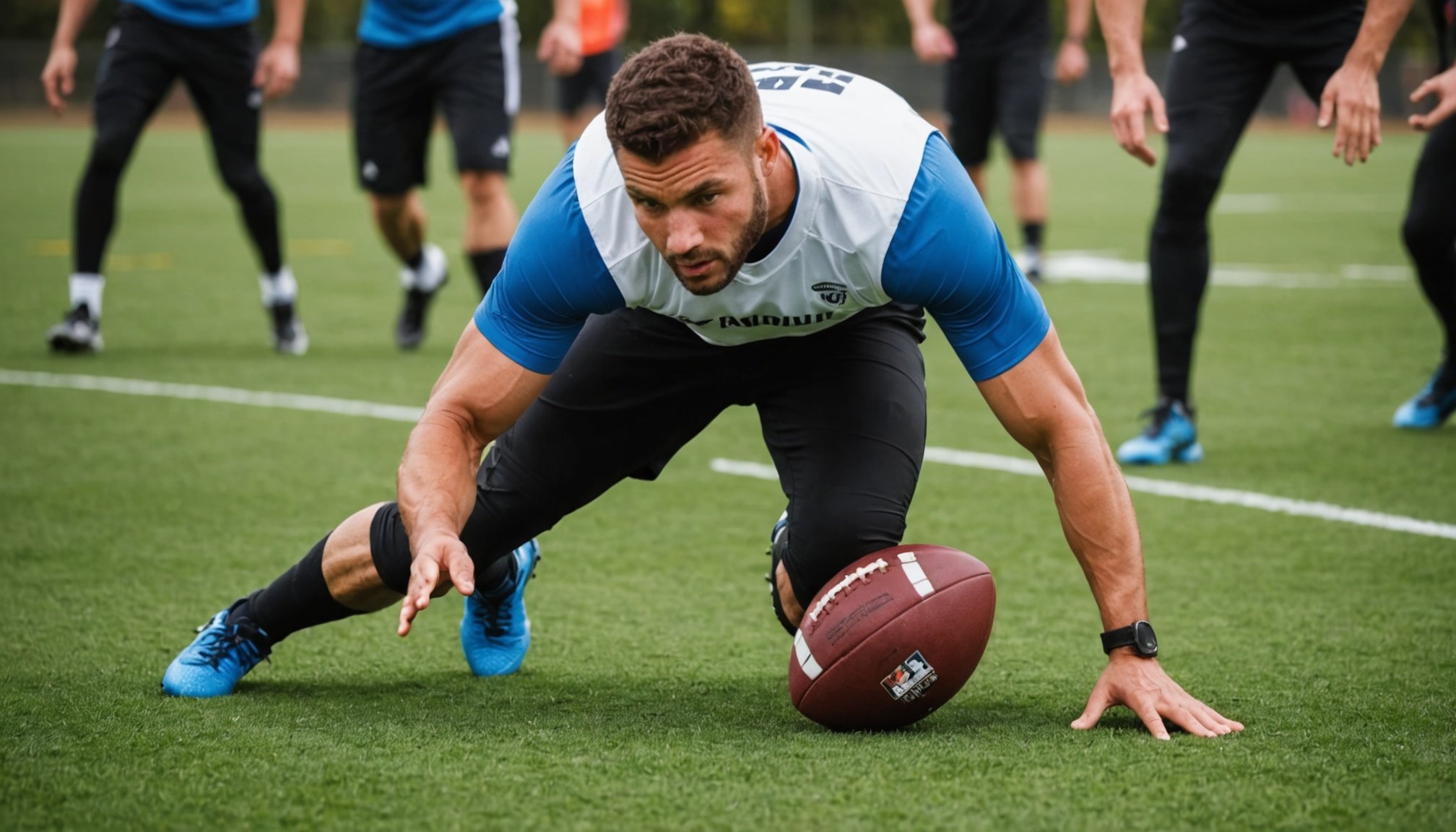Rehabilitation Techniques for Football Players
Injury recovery for football players is a critical process that requires tailored rehabilitation strategies to ensure a safe return to the field. The rehabilitation process is customized to address the unique demands of the sport, emphasizing both strength and mobility.
Physical therapy plays a pivotal role in the injury recovery timeline, acting as a cornerstone of successful rehabilitation. Therapists design personalized programs, considering the specific injuries and positions of players. This approach not only promotes healing but also minimizes the risk of re-injury.
Also to see : Mastering Communication: Essential Strategies for Football Captains to Excel Under Pressure During Intense Game Situations
Key rehabilitation exercises are crucial for maintaining strength and mobility. Targeted routines, such as resistance training and flexibility exercises, help in rebuilding muscle strength while enhancing range of motion.
Here are a few commonly used exercises:
This might interest you : Top Strategies to Boost a Footballer”s One-on-One Defensive Skills
- Strengthening Exercises: These include resistance bands and weight training activities that focus on major muscle groups used in football.
- Flexibility Routines: Dynamic stretches and yoga help maintain mobility, ensuring agility on the field.
- Balance Drills: Exercises designed to improve coordination are vital, especially for players recovering from lower limb injuries.
Ultimately, a well-structured rehabilitation program under expert guidance can significantly enhance the effectiveness of injury recovery for football players, contributing to a successful return to competition.
Alternative Training Exercises
When facing injury-prone situations, it’s crucial to consider alternative training methods to maintain fitness without exacerbating the problem. There are numerous low-impact workouts tailored to protect vulnerable areas while still promoting physical health. Activities like swimming and cycling provide cardiovascular benefits with minimal stress on joints, making them excellent options for individuals needing injury-safe workouts.
Incorporating cross-training activities during recovery can be beneficial for maintaining overall fitness without overburdening specific injured areas. Engaging in exercises like yoga or Pilates not only strengthens stabilizing muscles but also enhances flexibility and balance. These activities support the healing process by offering a holistic approach to maintaining fitness levels.
Flexibility and mobility drills are another vital component of a well-rounded training regimen, especially when dealing with injuries. By integrating stretching routines or dynamic mobility exercises, you can enhance joint health and prevent future injuries. Regular practice of these drills aids in improving movement efficiency and flexibility, allowing for a smoother transition back to regular training once recovery is complete.
Remember, maintaining fitness isn’t just about pushing through regular routines. It’s about adapting with smart, strategic approaches like alternative training to ensure longevity and overall well-being in your fitness journey.
Nutrition Tips for Optimal Recovery
Supporting recovery through the right nutrition can make a world of difference in an athlete’s journey back to fitness. Fuelling recovery involves incorporating essential nutrients and balanced dietary strategies.
Essential Nutrients and Supplements
When it comes to injury recovery, protein is crucial for repairing damaged tissues. Incorporating lean meats, eggs, and plant-based proteins can be beneficial. Additionally, omega-3 fatty acids, found in fish and flaxseeds, help reduce inflammation. Vitamins such as C and D support immune function and bone health, respectively. Considering supplements like collagen can also aid in joint recovery.
Meal Planning Strategies
Meal planning is pivotal in supporting fitness levels. Spread protein intake across meals to maximise muscle repair. Focus on antioxidant-rich fruits and vegetables to combat inflammation. Whole grains are excellent for sustained energy, whereas healthy fats provide essential fatty acids. Optimising your diet ensures effective fueling for the recovery process.
Importance of Hydration
Don’t underestimate the importance of hydration in recovery. Water supports cellular functions and transports nutrients. Athletes might need electrolytes, especially after intense workouts. Don’t wait for thirst to hydrate, as this is often a sign of existing dehydration. Opt for a hydration routine that suits your activity and climate needs.
Mental Wellness Strategies
Maintaining mental wellness is crucial for psychological recovery, especially for athletes who face demanding physical and mental challenges. Let’s dive into some effective strategies that can help manage stress and anxiety during recovery.
Recognising and acknowledging stressors is the first step towards mental wellness. Techniques like mindfulness meditation and deep-breathing exercises can be practical in calming nerves and reducing anxiety. These methods encourage living in the present moment, which can help alleviate stress related to future uncertainties. Regular practice can significantly benefit one’s mental state.
Another vital aspect is adopting an athlete mindset that focuses on resilience and positivity. This mindset underscores the importance of setting achievable goals that can lead to small victories, which in turn boost morale and motivation. Staying positive can be challenging, but engaging in activities that bring joy or connecting with supportive peers can help maintain an uplifting outlook.
Furthermore, accessing resources dedicated to mental support is essential. Professional advice from sports psychologists or counselors provides tailored strategies for psychological recovery. Support groups and community forums also offer platforms for sharing experiences, which can reduce feelings of isolation. For athletes, integrating these strategies fosters a balanced approach to recovery, promoting both mental and physical well-being.
Expert Testimonials and Insights
Athletes recovering from injuries require comprehensive guidance. Expert advice plays a crucial role in ensuring effective rehabilitation. Sports physiotherapists emphasize personalized recovery strategies. These include tailored exercises, nutrition plans, and mental support to accelerate healing. Each athlete’s journey is unique, highlighting the importance of individualized approaches.
Athlete success stories underscore the triumphs over physical setbacks. Testimonials often reflect themes of resilience and dedication. For instance, professional players share how commitment to prescribed rehab protocols led to regaining full fitness. One athlete mentioned, “The guidance I received was instrumental in hitting milestones on my road to recovery.” Such testimonials inspire those on similar paths by showcasing achievable outcomes.
Insights from coaches provide additional layers of understanding. Managing athletes during recovery is about balance. Coaches discuss strategies for gradual reintegration into training. This involves monitoring workloads and ensuring athletes don’t rush back too soon. A seasoned coach shared, “It’s crucial to communicate constantly with the physiotherapy team to track progress and identify optimal moments for re-engagement in competitive activities.”
Understanding these perspectives offers a comprehensive view of the recovery landscape. This gives both athletes and enthusiasts the tools to support and follow best practices in sports rehabilitation.










